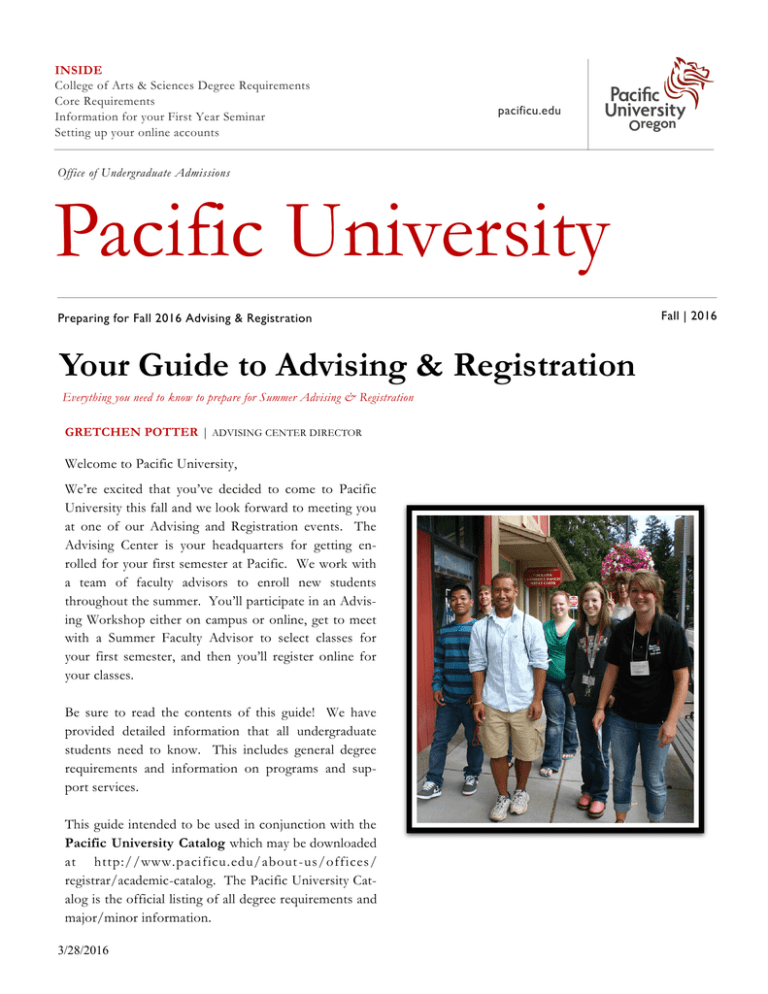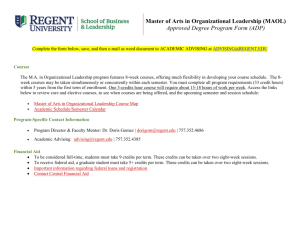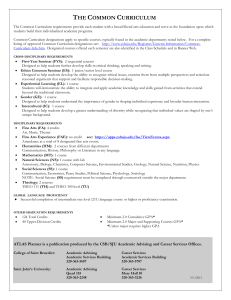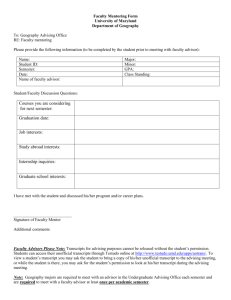INSIDE College of Arts & Sciences Degree Requirements Core Requirements
advertisement

INSIDE College of Arts & Sciences Degree Requirements Core Requirements Information for your First Year Seminar Setting up your online accounts pacificu.edu Office of Undergraduate Admissions Pacific University Preparing for Fall 2016 Advising & Registration Your Guide to Advising & Registration Everything you need to know to prepare for Summer Advising & Registration GRETCHEN POTTER | ADVISING CENTER DIRECTOR Welcome to Pacific University, We’re excited that you’ve decided to come to Pacific University this fall and we look forward to meeting you at one of our Advising and Registration events. The Advising Center is your headquarters for getting enrolled for your first semester at Pacific. We work with a team of faculty advisors to enroll new students throughout the summer. You’ll participate in an Advising Workshop either on campus or online, get to meet with a Summer Faculty Advisor to select classes for your first semester, and then you’ll register online for your classes. Be sure to read the contents of this guide! We have provided detailed information that all undergraduate students need to know. This includes general degree requirements and information on programs and support services. This guide intended to be used in conjunction with the Pacific University Catalog which may be downloaded at http://www.pacificu.edu/about -us/offices/ registrar/academic-catalog. The Pacific University Catalog is the official listing of all degree requirements and major/minor information. 3/28/2016 Fall | 2016 Your Bachelor’s Degree Your Bachelor’s degree is made up of 3 main parts: 1. Major: While the majority of your major coursework will take place your Junior and Senior year, you may have preparatory courses you need to take Freshman and Sophomore years, especially if you’re a science major. To view the preparatory coursework in a major, check the major information at the Advising Handbook website (http:// www.pacificu.edu//current-undergraduate/academics/academic-resources/academicadvising-handbook). All students start at Pacific as “Undeclared.” You can declare your major as early as Orientation and you must declare by the end of sophomore year. 2. Core: This is the key component of your Liberal Arts degree. All students will take coursework from a variety of disciplines such as math, foreign language, and the arts through specific requirements and the completion of two focal studies. (See Pacific University Core requirements for a full listing and http://www.pacificu.edu//currentundergraduate/academics/academic-resources/focal-studies for your focal study options.) For most majors, the majority of your Core classes will take place Freshman and Sophomore year. We recommend selecting your focal studies no later than the end of freshman year. You will be required to declare your focal studies when you’ve earned 45 credits. 3. Electives: What you do with your electives is up to you! Many students choose a minor or a 2nd major as part of their elective pool. Many of you are planning to go into one of Pacific’s graduate programs or into another graduate program. Your prerequisites for these graduate programs can also come out of your elective pool (when they aren’t part of your major or core requirements). Keep in mind the following when selecting electives: A. You must have coursework outside of your major! A maximum of 52 credits in a discipline may be applied toward the 124 credits required for graduation, the rest need to be in other disciplines. (Music majors may apply up to 60 hours of music courses.) Ordinarily, a course prefix indicates a discipline, except that the groupings EXIP and EXMB, ENGL and ENGW, THEA and APTH, EDUC and ESOL and SPED count as one discipline. B. You must have forty hours of upper-division courses (numbers 300 and above), with no more than 10 hours of internship credits, counting toward this 40-hour requirement. Most of this requirement will be completed through your major but not all. Normally you won’t start your upper division coursework until the end of Sophomore year. All Study Abroad coursework through Pacific University or affiliates will be counted as upper-division. C. You can use some activity credits towards your degree. A maximum of eight (8) credits of activity courses may count toward graduation in addition to any credits for activity courses prescribed by a student’s major or minor. These courses are taken to enhance and to add value to a student’s education. They typically focus on personal development, increased proficiency, or teamwork. Activity courses are: 1 or 2 credit Dance courses; HPER (PE) courses; Music Performance courses (150-167, 181-184, 187-188, 352-353, 358-359, 363-367); and Theatre Practicums (150-156, 450-454, 456). Please Note: To be eligible for graduation, a student must earn 124 credits and achieve a minimum cumulative grade point average of 2.0 at Pacific University (only grades earned at Pacific are calculated in the grade point average). All coursework for core requirements must be completed with a "C-" grade or higher. In addition, a 2.0 cumulative GPA is required in all majors and minors; check the A&S Catalog for major and minor requirements under the appropriate Division/Department headings because some departments may have adopted a higher minimum than 2.0. 3/28/2016 Pacific University Core Requirements All Undergraduate students will undertake a broad course of study by completing with at least a C – each of the Core Graduation requirements listed below. For many requirements you have several courses to choose from. Mathematics (4 Semester Credits) Writing (4 Semester Credits) Foreign Language (minimum 102-level course or proficiency) First Year Seminar (4 Semester Credits) The Four Cornerstones All Math courses numbered 165 or higher, PSY 350 (Behavioral Statistics), SOC 301 (Social Statistics), or equivalent statistics courses. All students are given an initial math placement base on SAT/ ACT scores and high school math coursework. (See Math Course Placement for more details). ENGW 201 Expository Writing or ENGW 202 Writing About Disability or ENGW 203 Professional Writing and Editing A proficiency in a language other than English must be demonstrated by the successful completion of a 102-Level course or its equivalent. A foreign language placement test will be used to determine your starting point in your language. (See Language Course Placement for more details). All freshmen must take Humanities 100 (FYS) in the fall semester. Students who receive a grade lower than C– in this class need to substitute 4 credits in English Literature or Philosophy (except logic or critical thinking). • Civic Engagement: a CE-designated course (2 or more credits) or project • International and Diverse Perspectives: IP- or DP-designated course (2 or more credits) or study abroad earning at least 12 credits • Research and Creative Achievement: senior capstone within major; other scholarly opportunities available • Future Focus: personal advising within major; other resources available via Career Development Center The Arts (4 Semester Credits) One 4-credit course or two 2-credit courses in Art Studio, Art History, Dance, Music (including selected 1-credit ensembles), or Theatre. The Social Sciences (4 Semester Credits) One 4-credit course or two 2-credit courses in Anthropology, Economics, Politics and Government, Psychology (except 350), Sociology (except 301), Social Work, or selected courses in Comparative Religion, Gender and Sexuality Studies, and Peace and Social Justice. The Humanities (4 Semester Credits) One 4-credit course or two 2-credit courses from English literature, selected Gender and Sexuality Studies courses, History (except 391), Humanities (except 100; 300), selected Media Arts courses, Philosophy (except 212), or selected World Languages courses. The Natural Sciences (4 Semester Credits) One 4-credit course or two 2-credit courses in Biology, Chemistry, Exercise Science (Integrated Physiology), Physics, Science, and selected courses in Environmental Science. Two Interdisciplinary Focal Studies (10-12 Semester Credits for each Focal Study) A focal study is a set of three related courses. Students should start exploring their focal study options this summer and fall of freshman year. For more info please see http:// www.pacificu.edu//current-undergraduate/academics/academicresources/focal-studies A senior project, internship (with a presentation), or performance/show in the major Senior Capstone (2 or more Semester Credits) 3/28/2016 Math Course Placement First use the chart below to estimate your Math Placement and to see what math classes you’d be eligible to take. Your SAT/ACT scores are critical to your math placement. Be sure to let the Advising Center know if you’ve sent in updated scores. Feel your math placement would be too low? You can take the math placement challenge at On Campus or Hawaii Advising, or at Orientation. College Algebra/Pre-Calculus Thinking about a major in the Natural Sciences? Math is critical to start right away, especially if you’ve placed at these levels. You must place at level II or higher or complete Math 122 before you can take Chemistry. Please note: these classes do not meet our Core math requirement. Calculus sequence If you need to take Calculus courses and how high you go into Calculus will vary depending on your math or science major (It is important to check science major sections in the Advising Handbook and the Pacific course catalog for specific math requirements in your major. For example Exercise Science majors do not need Math 226 or higher but Chemistry majors need through Math 227). Note: If you need any of the sequence between Math 122Math 228, it is strongly recommended you start these courses right away and not take any terms off in between. 3/28/2016 Statistics Statistics classes are required for several majors and as a prerequisite for many of our Health Professions graduate programs. We offer 3 different statistics options: Math 207, PSY 350, and SOC 301. Which option you might need or if you have a choice will vary depending on your major and graduate school plans. Freshmen do not usually take statistics in their first term so if you’ve placed at level 2 or higher, and only need statistics, you will wait to take math. Math for Elementary School Teachers The title of these math classes says it all! If you are thinking about Elementary Education you’ll want to plan on taking these courses. They are offered alternating years in Spring Semester—so you’ll be waiting to take math until Spring. Math 165 and Math 212 These math classes are popular ways to meet the Math Core requirement if you don’t have a specific math class to take for your major/graduate school prerequisites. These classes are usually offered in Spring Semester so you’ll probably not be taking math in your first semester. Language Course Placement If you are starting study of a new language you’ll be expected to take 101 and 102 levels in the language to meet the language core requirement. Because this is a full year it is a good choice to start your language study in your first term. If you have previously studied one of Pacific’s foreign languages (Chinese, French, German, Japanese and/or Spanish), you will be required take an initial language placement test. For additional language placement test information go to http://www.pacificu.edu/ about-us/centers-institutes/center-languages-international-collaboration/placement-testing. If you are placed above the 101-level you’ll need to take 1 class to satisfy the Foreign Language requirement in the core. The Advising Center recommends taking this class as soon as possible to successfully build on your prior knowledge. You’ll sign up for your language at the initial placement level. During orientation and the first two weeks of the semester you have the opportunity to adjust to a higher or lower level class, if necessary. You’ll need to talk with the World Languages Department to change your placement level. Level Foreign Language Course V 300-level courses IV 202 III 201 II 102 I 101 Thinking about studying abroad in a non-English speaking country? It is an incredible experience. In most cases you’ll need to complete the 202 level of the language—even more important to get started right away! First-Year Seminar & First-Year Experience All new freshmen are required to take Humanities 100: “Origins, Identity and Meaning” (also known as First Year Seminar or FYS). This class is intended to engage students in the task of personal and cultural critique, and designed to provide a common learning experience for the entire first-year class. Students will also have a common course book to read over summer. You are preregistered for First Year Seminar (HUM 100). This class will begin at Orientation and will help you get started at Pacific as well as providing you a strong writing background for future classes. Your FYS book and your first FYS assignment will be provided to you with your registration materials. The First-Year Experience (FYE) Program introduces incoming students to college academic life and the skills needed for success in that life. Many co-curricular activities are available to first-year students. In the fall you will attend cultural events in Portland with your FYS section, events like the opera, theatrical productions, plays, a visit to the Portland Art Museum, or perhaps the First Thursday art gallery openings. 3/28/2016 Course Selection & Registration How many classes should I plan to take? The real question is how many credits should I take? In general a credit is an hour in the classroom a week and you should plan for 2-3 hours of homework per week for every hour in the classroom! The minimum number of credits you can take is 12 and the maximum is 18. The average student load is 14-16 credits per semester. Most of our academic courses are 4 credits although you will find 2 credit classes as well. So for a 4 credit class you should plan on 8-12 hours of homework every week! Sounds like a lot? Remember, you’ll be taking fewer classes and they will meet less frequently than your High School courses did. What classes should I take my first semester? Every new freshman will take Humanities 100 “First Year Seminar” which is 4 credits. You’ll be pre-registered for this class. Should I take Math in my first term? The answer to this question depends on both your Math Placement and your Major/Career plans. In some cases it is critical to take math in your first term. (All students have to take a math class at some point—if you have math anxiety we have Tutoring and Learning Center to help.) We will go over this further in the Advising Workshop and you will want to have this conversation with your Summer Advisor but the information under Math Course Placement gives you some guidelines to think about. Think about continuing study in a Foreign Language. All students have to meet the Foreign Language requirement, so consider getting started on it! (See additional information under Language Course Placement). Take classes towards Core requirements (see University Core Requirements section for detailed information). Foundation courses for your major and/or graduate program prerequisites. See the Advising Handbook for your intended major and/or graduate program for requirements. You’ll see recommended coursework for Freshman and Sophomore year in many cases. Most science majors and students preparing for a Pacific Health Profession Program should anticipate taking CHEM 220 as a critical foundations course (check the Advising Handbook for recommendations) unless placed at Math Level I. Undecided? That’s okay! You’ll want to take more core requirements, especially in areas that might be of interest to you. A Note to Parents: We know this is an exciting time for you and your student. College is the time where students transition into independent adults. We view the Advising & Registration Events as the first opportunity for students to make that transition. Only our future students can go into the Advising Workshop, Appointment with the Faculty Advisor, and Registration room at the Events. If your student is participating from a distance we ask that you don’t join on the phone line just as our parents visiting campus don’t join in the campus advising appointment. 3/28/2016 To RSVP for Advising & Registration Students Coming to Campus for an Advising & Registration Event must do all of the following before they can RSVP for an event: Set up your PU Net ID and E-mail accounts: Set up your PU Net ID, E-mail account following the instructions sent to you by our Technology Helpdesk. Be sure to reset your password or you won’t be able to log-in next time! Complete your online Housing Application. You can fill this out once you’ve set up your PU Net ID account. Complete the Academic Interest Survey: You may have done this step early. The information you provided is what the Advising Center and the Summer Advisors will use to make course recommendations for you. Changed your mind about possible majors and career plans? That’s okay—but be sure to let your Summer Advisor (or the Advising Center) know so we can best help you. Take the online Language Placement Test. You can access the test at this website: http://www.pacificu.edu/about-us/centersinstitutes/center-languages-international-collaboration/placement-testing Submit Official College Transcripts for any College Courses you took through your High School. (See “Other Credits” section below for details). Part of one of our Athletic Teams? If you’re practicing during fall semester be sure to bring your practice schedule to your advising event We will do what we can to help you schedule around your practices. Students Participating in Advising & Registration from a Distance: Can’t come to campus? No problem! You can participate from a distance. You’ll complete the Advising Workshop as a webinar and your advising appointment will take place over the phone. Complete the steps above and RSVP to participate in a webinar/ distance version of the Advising & Registration Events. Other Credits Many of you are coming in with transfer credits or will get credit awarded for AP and IB tests. If possible, get your official college transcripts and/or test scores to us before your Advising and Registration event. Important! If you have earned college credit and have an AP or IB test for the same class you can only get the credits applied though AP/IB scores. Contact the Advising Center if you have questions. Advanced Placement Pacific awards 4 credits towards your degree for scores of 4 or 5 on the AP test in any field. International Baccalaureate, Pacific awards 8 credits towards your degree for each higher examination with a score of 5 or higher and 4 credits for standard examinations passed with 5 or higher. Completion of the IB diploma with a score of 30 or higher offers several benefits including sophomore standing. College transfer credits Submit your official college transcripts to Pacific University ASAP. Your courses will then be evaluated by the Registrars office. For questions about how your transfer, AP, or IB credits can be used towards your degree talk with the Advising Center or your Faculty Advisor. 3/28/2016 PUNet ID Your PUNet ID is the username you will use to log on to various electronic resources at the University. Your PUNet ID is listed on your BoxerCard. It contains parts of your last name and student ID number, for example, smit1234. Your PUNet ID is your username for logging into BoxerOnline, Blackboard, BoxerMail, BoxerAlerts* and public computers. When your PUNet ID is first created, it has a default password of PassMMDD, where MM and DD are the two -digit Month and Day of your birth date. You must log into MyAccount (account.pacificu.edu) and change your password before you can access the other resources listed in this document with your PUNet Account. What is Moodle? Moodle is Pacific University’s online course management system. Instructors use Moodle to distribute information to students, accept assignment submissions online and even to give tests online. To access Moodle go to “Online Tools” at http:// www.pacificu.edu/about-us/offices/university-informationservices/online-tools) and log on with your PUnet username and password. Getting Tech Help The Technology Information Center (TIC) is the University’s technology helpdesk for students, faculty and staff. The TIC is located on the lower level of Marsh Hall and is open 8am to 8pm most weekdays (check the TIC webpage, http:// www.pacificu.edu/about-us/offices/university-informationservices for current hours). You can also reach the TIC by calling 503.352.1500 or by emailing help@pacificu.edu. The TIC provides support in all areas of information technology and can also service student laptops. Boxer Card Your Boxer Card is a multi-functional ID card. It serves as your student identification card, library card, door access key, meal card, and much more. You will take your picture for your Boxer Card at on-campus or Hawaii Advising and Registration. If you aren’t able to come to campus for advising then you will take your picture at Orientation. If you have problem with your BoxerCard call Campus Public Safety at x.2230 (503.352.2230 off-campus) or email cps@pacificu.edu. Boxer Online This website allows you to view your grades, class schedules and financial information and even to make payments or authorize others to view your financial information. To access BoxerOnline go to “Online Tools” at http://www.pacificu.edu/ about-us/offices/university-information-services/online-tools and log on with your PUNet username and password. Computer Recommendations Pacific University supports both PC and Apple computers, although in general the PC is a more universally supported platform. Technology continues to advance at a very rapid pace, so Pacific University recommends you acquire the best laptop you can afford. Pacific University has a special arrangement with Dell to offer discounted systems that meet or exceed our recommended specifications below. Visit the University Information Services webpage for direct links to Dell offers. Our web site can also direct you to software, printers and more at prices generally lower than other commercial retail Internet sites. You are free to purchase your system, software, and peripherals from whomever you like. Your new computer should have Mac OS 10.6 (Apple computers) or Windows 7 (PC computers). The standard productivity software in use at Pacific University is Microsoft Office. There are several versions of Microsoft Office available but we recommend, at least, the Microsoft Office 2010 Home & Student edition (Windows) of Office 2008 (Mac), which includes Word, Excel and PowerPoint. Many students have Microsoft Works pre-installed on computers that they purchase and believe that it will be compatible with Microsoft Office. The University offers technical support to students, however we are not able to fix every problem. A computer failure can severely impair your academic work and so the purchase of a multi-year extended warranty with on-site repairs strongly recommended. 3/28/2016 Career Advising Career Development Resources for students. It is the goal of the Career Development Center to weave career advising and career preparatory activities as seamlessly as possible into students’ Pacific experience. Research and experience confirm that students have many questions about how to connect academics to careers. Therefore, all undergraduates are assigned career advisors by the CDC to help ensure that students develop and maintain an actionable Future Focus throughout their undergraduate experience to maximize their success at launching meaningful and rewarding careers upon graduation, if not before. Services Offered: Connecting Major Skills and Experience to Careers Administering Career Interest and Values Inventories Exploring Occupations and Decision Making Styles Understanding the Value of a Liberal Arts Education Networking with Alumni and Other Professionals Securing an Internship to Gain Experience Finding Part-Time and Summer Employment Optimizing the Work-Study Experience Launching a Full-Time Job Search Researching and Applying to Graduate Schools Developing Résumés and Cover Letters Articulating Strengths to Prepare for Interviews Visit the Career Development Center at Chapman Hall, or call x2877 to schedule an appointment with their career advisor. Voyages Want to embark on an incredible journey to begin your experience at Pacific? There is no better way than going on a Voyage for a fun and challenging adventure! Are you Ready? Adjusting to your new life as a college student can be daunting. That's why we offer incredible preorientation adventures to help prepare you for success! On our 4-5 day Voyage trips, you have the opportunity to build new skills and make long-lasting relationships for your time at Pacific. As a Voyage participant you will... Experience the Pacific Northwest on a Wilderness, Outdoor or Civic Engagement Voyage of your choice Make new friends and develop a network of support (even before Orientation begins) Connect with fun, successful, involved upperclassmen Develop resiliency, community building, and leadership skills Keep a Leadership Log to help you make the most of your time at Pacific University Have Fun! 3/28/2016 Academic Advising The Advising Center and your Faculty Advisors are here to help you navigate your academic experience. The Advising Center is a resource for all undergraduate students and works closely with the Faculty Advisors. You can schedule an appointment at the Advising Center to go over your degree plan and have advising questions answered. You will each be assigned an Academic Advisor who you will meet at Orientation (this advisor will probably not be your Summer Advisor) from either the Faculty or Advising Center. As you decide on your major you may change your advisor. Once you are ready to declare your major you must have a Faculty Advisor from that department. You may also have more than one advisor if you are double-majoring or doing a minor. Next Steps After Advising: Read your FYS book and complete your FYS pre-assignments. Check out your textbook needs. Books for classes are listed at the Bookstore website. We’ll see everyone at Orientation where you’ll get a chance to meet your Permanent Advisor. (This may or may not be your Summer Advisor). Academic Questions? Contact the Advising Center at 503.352.2800 or advisingcenter@pacificu.edu Questions? Jot them down before you forget! 3/28/2016 QUESTIONS? Call 1.800.677.6712 Authorize your PUNet ID June 13 Participate in Advising & Registration On-Campus & Distance Events July 7-August 11 Hawaii July 16 Review your University Account After Your Advising & Registration Day Enroll or waive Pacific University Student Health Insurance August 13 Pay Tuition & Fees August 15 Submit immunization & health form to Student Health Center August 15 Submit Final High School and/or College Transcripts August 15 Submit Official AP and/or IB exam scores August 15 Complete FYS Summer Reading & Assignment Deadline provided by your FYS professor Attend Fall Orientation & Move-In August 28 3/28/2016



